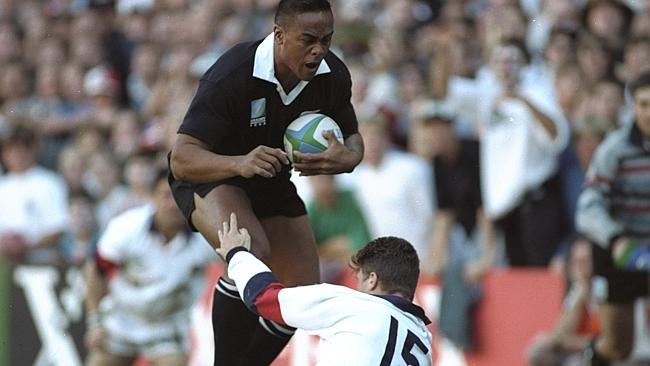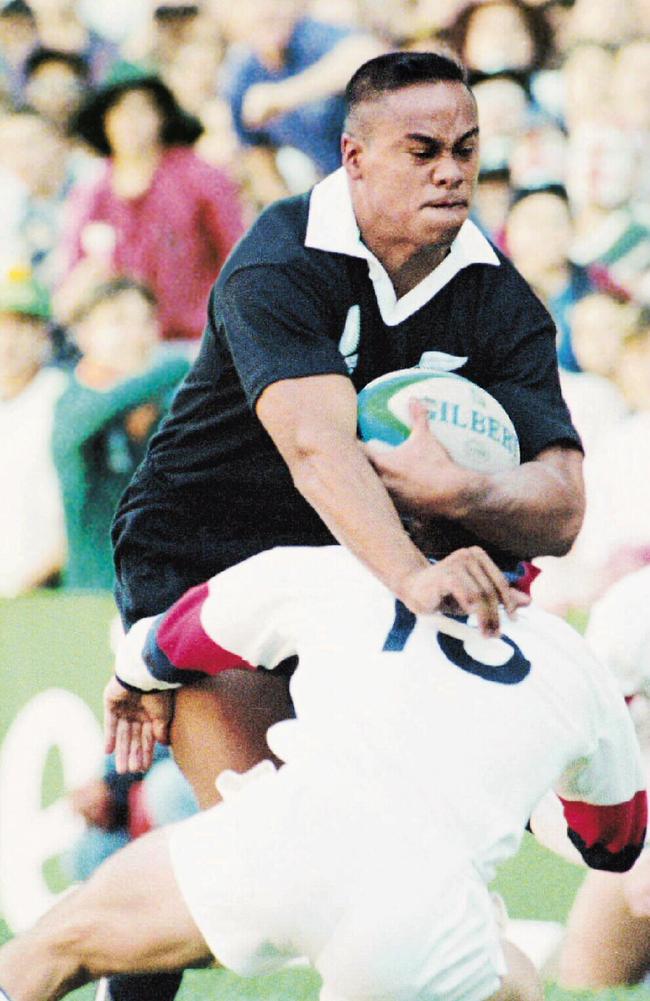Giant Jonah Lomu an unstoppable force on the rugby field
Few players can be given credit for changing the face of their chosen sport, but Jonah Lomu sent rugby in a new direction

Today in History
Don't miss out on the headlines from Today in History. Followed categories will be added to My News.
Australian Rugby Union CEO Bill Pulver has called him “rugby’s first genuine superstar”. The late, great All Black Jonah Lomu first attracted the awe of fans in the early 1990s, at a time when rugby went professional. In a rapid rise to the top of the sport, at the time he was the youngest player to make it to the elite ranks of the All Blacks, playing 73 games in the famous black jersey.
Lomu was the kind of player who pulled huge crowds. Performing sometimes freakish feats on the field, he left opponents and commentators bewildered by his speed, power and skill. He made a courageous comeback in 2005 after a kidney transplant before retiring from the game in 2007. The kidney ailment he had battled since 1995 finally killed him on November 17.
He was born Jonah Tali Lomu in Auckland in May 1975, to Tongan immigrant parents Semisi and Hepi. Although they had moved to New Zealand, they insisted Jonah have some idea of his Tongan heritage and he spent many years of his childhood on the Tongan islands.
His experience of Auckland was of a place of violence and poverty.
An uncle and a cousin were murdered when he was 12.
Lomu was not a violent person but when violence caught up with him, he was more than able to hold his own, as this incident made clear.
At the age of 13 he was sitting alone when approached by a mugger who demanded he hand over his shoes. Lomu stood up, his more than 1.8m of height towering over his would-be attacker.
The mugger told him “Sorry, I’ve changed my mind” and ran away.
Despite his size, Lomu was amazingly fast and agile, talents that stood him in good stead in both athletics and in team sports.
At first he preferred rugby league, but union was the more prestigious game in New Zealand.
He became a star player in local teams, playing in the National Championships by the age of 18.
He represented New Zealand in an under-19s team before finally getting his first Test cap in 1994, making his debut in a Test against an in-form France. The French played some great rugby and New Zealand lost the series 2-0 but Lomu had obviously shown enough promise to be selected for the 1995 World Cup team.

This was where he won the awe of the world for the first time.
In the semi-final he scored four tries, one of them by running over the top of English player Mike Catt.
Despite this, New Zealand were beaten by South Africa in the final by a narrow margin and Lomu would never reach rugby’s highest pinnacle by playing in a World Cup-winning team.
A genuine crowd-pleaser, he had however shown the rugby world a powerful new style of play, which would influence the way others played.
After his World Cup performance Lomu was confronted by a host of lucrative offers to switch to other codes, including league and even American football.
He never made the jump and later that year rugby went professional, turning Lomu into a rich superstar.
That year he also learned that he was suffering from a kidney ailment.
The illness was kept secret from the public for years.
It forced him to take time off from playing in 1997. His weight ballooned and he hit a low ebb.
But Lomu fought back and joined the All Blacks again in 1998 to help the team win gold at the Commonwealth Games in the Rugby Sevens.
In 2003 it was revealed he needed a kidney transplant.
Radio presenter Grant Kereama obliged with the donation of a kidney and in 2005 Lomu made a comeback but it was clear that the illness had taken its toll and he retired from the game in 2007.
He was inducted into the Rugby Hall of Fame that year.
After a brief flirtation with amateur bodybuilding in 2009 he made yet another return to rugby, playing for a French third division team but he struggled in the first game and soon retired for good.
In 2011 he had to withdraw from a charity boxing match in New Zealand due to ill health. Living in England he had been involved in promotions for the recent World Cup there.
He died in Auckland while visiting his family. He is survived by his third wife Nadene and two sons.
Originally published as Giant Jonah Lomu an unstoppable force on the rugby field



